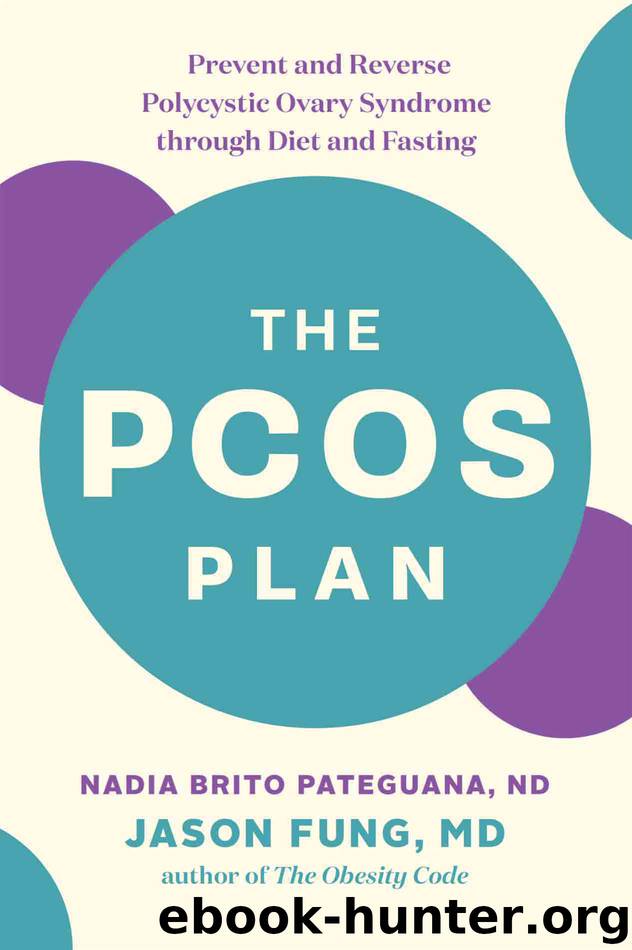The PCOS Plan by Nadia Brito Pateguana

Author:Nadia Brito Pateguana
Language: eng
Format: epub
Publisher: Greystone Books
Published: 2020-04-15T00:00:00+00:00
The Optimal Diet for PCOS
.................
IF YOU SUFFER from PCOS, then you need to follow an insulin-lowering diet, which is not necessarily low in calories. You need to know what foods have a high or low insulin effect. You also need to know when to eat those foods. The optimal diet for PCOS has two parts: what to eat and when to eat.
WHAT TO EAT
ALL CARBOHYDRATES WILL produce an insulin response, but the biggest culprit is the refined carbohydrates such as sweets, white bread, and flour. Unprocessed carbohydrates, such as legumes and tubers, have much lower insulin stimulation compared with processed carbohydrates such as bread and sugar. The standard low-fat, calorie-reduced diet is typically high in carbohydrates because it follows the original 1977 U.S. dietary guidelines, which suggested carbohydrates constitute 55 to 60 percent of the diet. This amount might be OK if we were eating a lot of sweet potatoes like the Okinawans, but we were directed to eat 6–11 servings per day of highly refined grains in the bread, cereal, rice, and pasta group, which will raise insulin tremendously.
Refined carbohydrates generate the largest insulin response; dietary protein, particularly animal protein, also has a significant insulin response; and dietary fat, almost none at all. Protein, however, has the greatest effect on satiety, which makes us feel full. Thus, the optimal diet for reducing insulin limits refined carbohydrates, because the body does not need carbohydrates for good health, and it includes a moderate amount of dietary protein, since we need a certain amount to maintain health. But because it can also cause a significant insulin response and because the body cannot store excess dietary protein, eating more than is needed is not recommended. Dietary fat, on the other hand, should not be feared and should be included. This may come as a bit of a shock if you’ve lived through the fat phobia of the 1980s and 1990s.
Need proof? The brilliant Cambridge-educated researcher Dr. Zoë Harcombe demonstrated there is no evidence that dietary fat contributes in a meaningful way to the development of heart disease.1 (She is my female crush, by the way!) In her fascinating book The Big Fat Surprise: Why Butter, Meat, and Cheese Belong in a Healthy Diet, the American journalist and author Nina Teicholz details the roots of our epic misunderstanding about dietary fat. And the largest nutritional trial ever done, the Women’s Health Initiative (WHI), also proved that reducing dietary fat does not reduce cardiovascular disease.2 It showed that eating a low-fat diet carries the same risk of heart disease as a higher-fat diet. It is on the back of studies such as the WHI’s that the term “healthy fat” has gradually entered the lexicon, as we’ve started to realize that eating fat is not going to kill us.
Download
This site does not store any files on its server. We only index and link to content provided by other sites. Please contact the content providers to delete copyright contents if any and email us, we'll remove relevant links or contents immediately.
| Breast Cancer | Candida |
| Chronic Fatigue Syndrome & Fibromyalgia | Endometriosis |
| General | Lupus |
| Menopause | Menstruation |
| Postpartum Depression | Pregnancy & Childbirth |
| Sexual Health |
Name Book, The: Over 10,000 Names--Their Meanings, Origins, and Spiritual Significance by Astoria Dorothy(2490)
Tone Your Tummy Type by Denise Austin(2367)
The Women's Health Fitness Fix by Jen Ator(1925)
The Expectant Father by Armin A. Brott & Jennifer Ash(1894)
The Coregasm Workout by Debby Herbenick(1819)
The Ultimate Guide to Anal Sex for Women by Tristan Taormino(1752)
Expecting Better by Emily Oster(1706)
She-ology by Sherry A. Ross MD(1697)
The Hite Report on Shere Hite by Shere Hite(1661)
8 Steps to Reverse Your PCOS by Fiona McCulloch(1595)
Woman: An Intimate Geography by Natalie Angier(1583)
Birth by Tina Cassidy(1571)
Women & the Weight Loss Tamasha by Diwekar Rujuta(1525)
The Female Brain by M.D. Louann Brizendine(1514)
101 Get-Lean Workouts and Strategies by Muscle & Fitness(1506)
50 Ways to Soothe Yourself Without Food by Susan Albers(1399)
The Big Booty Blueprint: Your Guide To A Bigger Butt In Less Than 12 Weeks by Bella Rahbek & Brandon Carter(1367)
Unleash the Power of the Female Brain: Supercharging Yours for Better Health, Energy, Mood, Focus, and Sex by Daniel G. Amen M.D(1285)
The overachievers by Robbins Alexandra(1284)
